When the vehicle’s PCM detects a P0420 code, it means that the catalytic converter is malfunctioning.
Catalytic converters remove harmful pollutants from exhaust pipes by reducing the amount of pollutants produced during the combustion process.
Misfires or rich or lean conditions are other causes of Honda P0420, but a bad catalytic converter is the most common.
The driver is not in danger, but this code needs to be fixed as soon as possible to avoid more problems and a failed emissions test.
What Does P0420 Mean?
The code P0420 stands for Catalyst System Efficiency Below Threshold. This means that the oxygen sensors in your exhaust system have detected that the catalytic converter is not working as efficiently as it should.
It is most commonly caused by a faulty catalytic converter that a P0420 code is displayed. The catalytic converter is a device that reduces harmful emissions from your engine by converting them into less harmful substances.
The oxygen sensors monitor the amount of oxygen in the exhaust before and after the catalytic converter.
If the oxygen level after the catalytic converter is too high, it means that the converter is not doing its job properly, and the code P0420 is triggered.
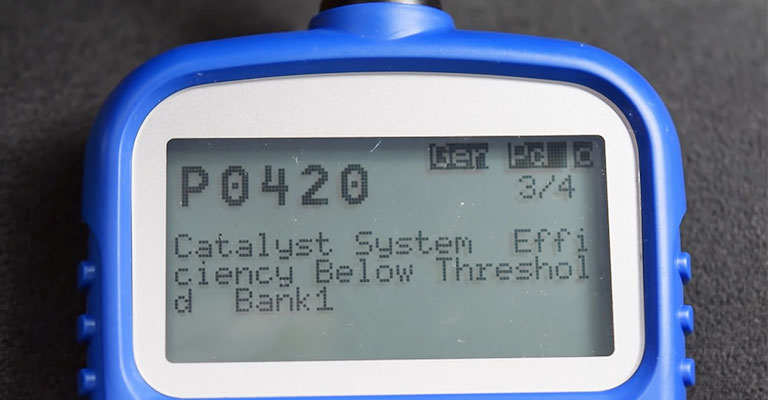
Upstream oxygen sensors should exhibit a fluctuation in their readings when the car is running in a closed loop and at operating temperature.
A stable reading should be obtained from the downstream oxygen sensor if there is no problem with the catalytic converter. However, it indicates a problem with the catalytic converter when the oxygen sensors read similar values.
As soon as the voltage of the downstream oxygen sensor begins to drop and fluctuate like that of the upstream oxygen sensor, the Powertrain Control Module (PCM) turns on the check engine light and stores the P0420 trouble code.
Understanding the Catalyst System Efficiency Below Threshold
The catalyst system, comprised of various components, plays a critical role in reducing harmful emissions produced by vehicles. Central to this system is the catalytic converter, which serves as a key component in the emissions control process.
The catalytic converter is responsible for facilitating chemical reactions that convert harmful gases into less harmful substances.
Inside the converter, precious metals such as platinum, palladium, and rhodium act as catalysts, promoting the conversion of toxic pollutants.
Carbon monoxide (CO) is transformed into carbon dioxide (CO2), nitrogen oxides (NOx) are converted into nitrogen (N2), and unburned hydrocarbons (HC) are oxidized into carbon dioxide and water vapor (H2O).
Maintaining optimal catalyst system efficiency is crucial for environmental compliance. By effectively reducing harmful emissions, the catalyst system helps to improve air quality and minimize the impact of vehicle exhaust on the environment.
It contributes to meeting regulatory standards for emissions set by government agencies (EPA), promoting a cleaner and healthier environment for all.

Several components work together to ensure the catalyst system’s efficiency and performance. You might like to know –
The Oxygen Sensors
Oxygen sensors located in the exhaust system monitor the amount of oxygen present in the exhaust gases.
They provide feedback to the engine control module (ECM) about the air-to-fuel ratio, allowing the ECM to make adjustments for optimal combustion and efficient operation of the catalyst system.
Malfunctioning or faulty oxygen sensors can lead to inaccurate readings and affect the catalyst system’s efficiency.
Exhaust Leaks
Any leaks in the exhaust system can introduce additional oxygen into the system, disrupting the proper functioning of the catalytic converter.
Excess oxygen can hinder the catalytic reactions, leading to reduced efficiency and triggering catalyst system efficiency below threshold codes.
Identifying and repairing exhaust leaks is essential for maintaining optimal catalyst system performance.
Engine Control Module (ECM)
The ECM, also known as the engine control unit (ECU), is responsible for monitoring and controlling various aspects of the vehicle’s operation.
It receives input from sensors, including oxygen sensors, and makes adjustments to optimize engine performance and emissions control.
Outdated software in the ECM can lead to incorrect readings and affect the catalyst system’s efficiency. Keeping the ECM software up to date is crucial for accurate monitoring and control of the catalyst system.
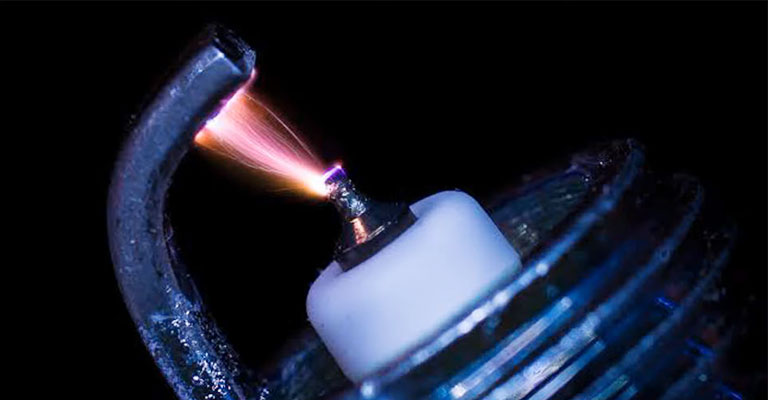
Why Do P0420 Codes Occur? The Aditional Causes
Check engine code P0420 is most commonly caused by catalytic converter failure, but other issues can also cause it. Misfires and an incorrect air-fuel ratio could be the root cause of converter failure, so look for other codes. The P0420 code can also be caused by:
- Incorrect fuel type use (leaded fuel rather than unleaded fuel)
- There is high fuel pressure
- There is a leak in the fuel injector
- Connectors on oxygen sensors that are damaged
- Unconnected oxygen sensor wiring
- The wiring of the oxygen sensor has been damaged
- Oxygen sensors at the front or rear are faulty
- The temperature sensor for the engine coolant is faulty
- Catalytic converter contaminated with oil
- Engine misfire
- A damaged exhaust pipe or a leaky exhaust pipe
- Leaky exhaust manifolds or damaged exhaust manifolds
- The muffler is damaged or leaking
P0420 Code Symptoms
There are four common indicators for the P0420 code, even though there are usually no noticeable symptoms of a catalyst system failure, including problems with drivability:
- The Exhaust Pipe Smells Like Rotten Eggs
Catalytic converters fail to convert oxygen properly, causing excess sulfur to accumulate in the fuel tank, which causes the exhaust system to smell.
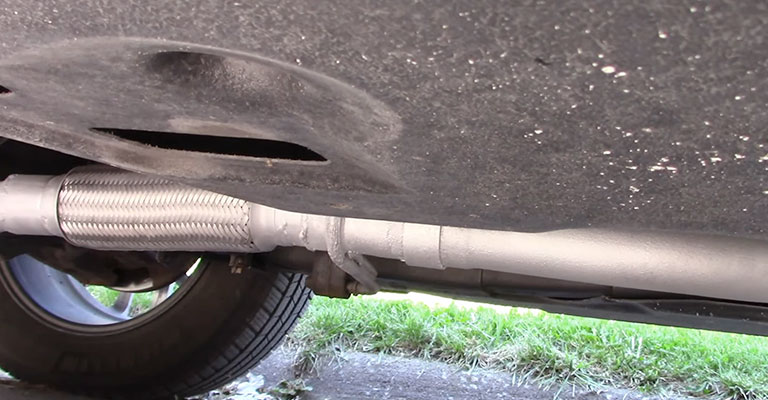
- Vehicle Speed Is Limited To 30-40 Mph
If you drive slower through mostly residential areas, you may not notice the symptom, but you may experience it on highways and freeways with higher speed limits.
- When The Vehicle Warms Up, It Lacks Power
You will not be able to accelerate as quickly, and the engine will run poorly.
- There Is A Check Engine Light On
Many factors can trigger the check engine light. A diagnostic tool is necessary for a mechanic to determine the cause of the problem.
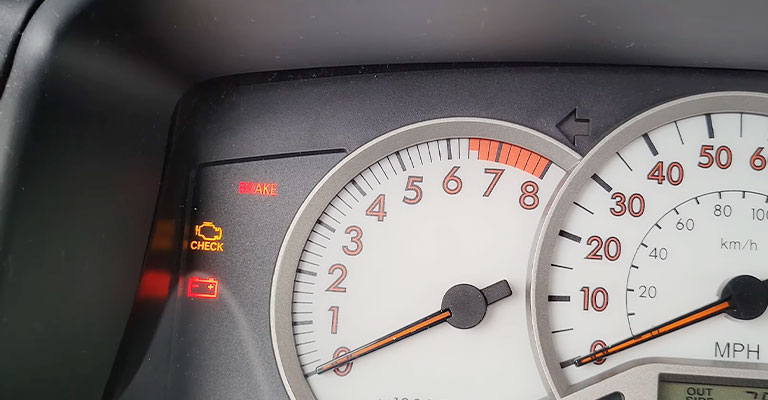
How to Diagnose P0420?
To diagnose the code P0420, you will need a scan tool that can read and clear trouble codes. You will also need to inspect the exhaust system for any leaks, damage, or corrosion.
You will also need to check the oxygen sensors for proper operation and wiring. Here are some steps to follow:
- Connect the scan tool to the OBD-II port under the dashboard and turn on the ignition.
- Read the trouble codes and note any other codes that may be related to the code P0420.
- Clear the codes and drive the vehicle for a while to see if the code comes back.
- If the code comes back, check the freeze frame data to see the conditions when the code was set.
- Inspect the catalytic converter for any signs of damage, contamination, or overheating. You can also use an infrared thermometer to measure the temperature of the converter before and after it. If the temperature difference is less than 50°F, it means that the converter is not working efficiently.
- Inspect the oxygen sensors for any signs of damage, corrosion, or contamination. You can also use a multimeter to measure their voltage and resistance. The voltage should fluctuate between 0.1V and 0.9V at a steady rate. The resistance should be within the specifications of your vehicle.
- Inspect the exhaust system for any leaks, cracks, or holes. You can also use a smoke machine to inject smoke into the exhaust and look for any leaks.
- Check the fuel pressure and fuel injectors for proper operation and flow. You can also use a scan tool to monitor the fuel trim values. The fuel trim values indicate how much the ECM is adjusting the fuel mixture to keep it optimal. If the fuel trim values are too high or too low, it means that there is a problem with the fuel system.
- Check the spark plugs and ignition coils for proper operation and condition. You can also use a scan tool to monitor the misfire counts. If there are any misfires, it means that there is a problem with the ignition system.
How Do I Fix My Honda P0420 Code?
Diagnosing the catalytic converter is the first step to figuring out the problem. We recommend finding a Honda-certified shop near you if you are experiencing catalytic converter problems and do not feel comfortable diagnosing the issue at home.
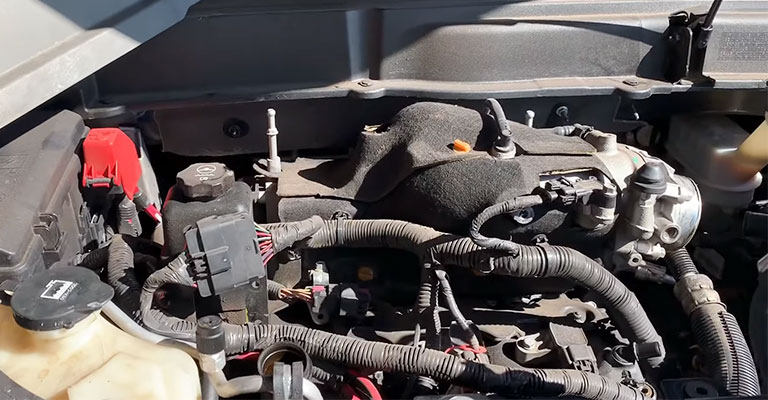
What Is The Cost Of Fixing A P0420?
Many things can cause P0420, from a bad sensor to a failed catalytic converter. If the issue has not been properly diagnosed first, it is impossible to give a proper estimate.
A typical cost for this service is between $75 and $150, depending on the shop’s labor rate.
Many shops will apply this diagnosis fee to any repairs that need to be performed if you have them perform them.
In this case, a shop will be able to provide you with an accurate estimate for repairing your P0420 problem.
The underlying issue behind P0420 may require one or more of the following repairs once it has been properly diagnosed.
All prices include parts and labor and are based on national averages. You may have to pay a different amount depending on your location and the type of vehicle you drive.
- The cost of repairing a leak in the exhaust can range from $100 to $200 (if it must be welded).
- The cost of a catalytic converter ranges from $400 to $2400
- Replacement of oxygen sensors costs between $275 and $500
- The price of an air-fuel sensor ranges from $200 to $300
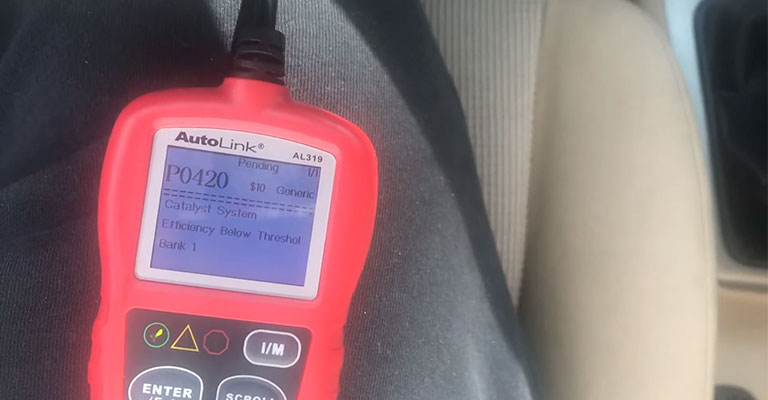
What Is The Severity Of The P0420 Error Code?
If the driver encounters the P0420 error code, he or she may not experience any drivability problems. In addition to the Check Engine Light being on, this trouble code may not cause any noticeable symptoms.
It can cause serious damage to other vehicle components if the vehicle remains in error without being addressed. The P0420 trouble code has no symptoms associated with drivability, so it is not considered serious or dangerous.
A catalytic converter could be seriously damaged if the code is not addressed promptly. Due to the cost of repairing a catalytic converter, the P0420 trouble code must be diagnosed and repaired as soon as possible.

Mistakes To Avoid When Diagnosing P0420
O2 or A/F sensors are frequently suspected as the cause of this code. Although this is a possibility, a faulty catalytic converter is much more likely to be the problem. Do not overlook other codes that are paired along with P0420.
P0300 to P0308 are misfire codes that require misfire diagnosis. For example, when a catalytic converter is not repaired before it is replaced, the misfire will cause it to fail.
If your engine runs rich or lean, you can burn out your catalytic converter, so make sure you don’t have codes P0174, P0171, P0172, or P0175. It is essential to address these codes first, as well as any other codes that may be present.
Is It Possible To Drive With A P0420 Code?
Although you may be able to drive your car with a P0420 code, doing so is not recommended. You may experience increased emissions and decreased fuel economy if your catalytic converter does not work properly.
It is possible to damage other engine parts when driving with a defective catalytic converter. Therefore, once you discover a P0420 code, you should have it repaired.

The Bottom Line
Correcting the ignition system, fuel system, air intake, and misfire problems as soon as possible is important to avoid damage to the catalytic converter. These components often cause P0420 trouble codes.
It is better to replace a catalytic converter with an OEM unit or a high-quality oxygen sensor replacement when replacing a catalytic converter.
The P0420 trouble code may return when aftermarket oxygen sensors fail, which is common. In addition, it is a good idea to contact the manufacturer to see if a manufacturer’s warranty covers the emissions-related parts of your vehicle.

Leave a Reply